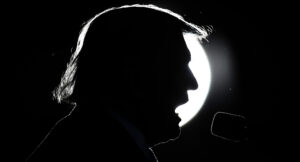At a certain point in the life cycle of every civilisation, intellectuals become entranced with the idea that there must be a rational order underlying the blooming, buzzing confusion of the universe. At this stage, most people hail the triumph of reason, and take it for granted that everything else can and will be reduced to obedience in due time.
Of course, that’s not how things work out because the universe, with its usual serene indifference to all things human, refuses to play along. Crisis arrives when too many failed predictions turn rationalism into a laughing stock, and the whole enterprise grinds to a halt as people abandon it. That’s what happened in ancient China, in the twilight of the Chou dynasty, when its rationalist schools failed to bring good government; it’s what happened in ancient Greece in the twilight of the classical age, when its rationalist philosophy failed to inspire moral virtue. It is happening now, in the twilight of the industrial era, as our rationalist sciences fail to provide the Tomorrowland future we’ve been promised.
One of the ways you can tell that an age of reason is coming to an end is that magic comes back into fashion. Here again, we’re following the usual path at the usual pace. The revival of magic that began in a very quiet way in the 1850s, and first found a wider public in the 1890s, went into overdrive in the Seventies and hasn’t looked back. Earlier this week, the University of Exeter in Britain announced a new degree in “Magic and Occult Science” to reflect a “recent surge in interest in magic” among young Brits.
However, the popular revival of magic does nothing to guarantee that it will be done with any degree of competence. Quite the contrary, most of the people who take up magic in the twilight of an age of reason are still far too influenced by the ideologies of the departing era, and so they generally make a hash of things. This is especially visible in the realm of political magic.
Yes, there is such a thing as political magic. We saw quite a bit of it thrown about on both sides during the 2016 US presidential election, as I argue in my recent book, The King in Orange. A modest amount was competent, but most of it was either the fumbling of enthusiastic beginners or the blunders of people who thought they knew much more about magic than they did. This not only risks bringing the ancient and honourable art of magic into disrepute, but also has the potential to create a lot of collateral damage.
Doubtless, there will be plenty of magic deployed in next year’s presidential election too. With this in mind, I’m going to offer some instruction in the art of magical combat on the off chance that both sides in the upcoming electoral squabble might listen — rather than flailing around like drunken halfwits, trying to bash each other with weapons they don’t know how to use.
Let’s start with some necessary clarifications. If your exposure to magic consists of reading denunciations of it by ranting sceptics, you know nothing about it. If it consists of fantasy novels and Hollywood spectacles, you know even less. Let’s be even more specific and formulate a rule, which I hereby name Rowling’s Law: if it looks like the sort of schlock you’d see in a Harry Potter movie, it’s not real magic.
Magic is the art and science of causing changes in consciousness in accordance with will. It doesn’t affect matter directly, and it can’t be used to overturn the laws of nature. Within those limits, it can accomplish astounding things. If you examine your experience of the world, you’ll find that only a modest portion of it depends on the material realities that surround you: much more depends on what you perceive, feel and think about those realities and the subtler social, psychological and spiritual realities that also surround you.
These latter elements are the raw materials of magic. The tools of magic are will and imagination, whose power can come from many sources, of which human emotion is generally the easiest to access. The forms that give it direction and effect are symbols and symbolic action. Here, the basic principle can be stated simply enough: a symbol held in one mind, charged with will and desire, can affect another mind even when there’s no obvious way for the effect to take place. What this implies, of course, is that individual human minds are not as isolated from one another as most current ideologies like to insist.
Before we get into the rules for effective magical combat, however, I’m going to have to give two warnings. I’ve learned from long experience that I can say these things in so many words and people will blow right by them in their quest to misunderstand magic, but the effort has to be made. Here goes:
Warning No. 1: The rules that follow apply only to magic. They don’t apply to military or political strategy, say, or anything else that takes place principally in the material world.
Warning No. 2: The rules that follow have nothing to do with ethics or morals or who’s more virtuous than the other guy. I’m talking about what works.
With those in mind — and please do keep them in mind — we can proceed to the central principle of effective magical combat in the political sphere: “You win a magical struggle by formulating an ideal as strongly, precisely, and vividly as possible, while completely ignoring the other guy.”
Did you keep my two warnings in mind? To judge from my repeated experience, the moment they read those words, people immediately try to apply them to military and political strategy, probably having to do with the Nazis, who exert a weird gravitational attraction on people’s imaginations. What goes through their minds is this: that’s very sweet and moral and pure, but Churchill couldn’t have stopped the Nazis if they’d just formulated an ideal, blah blah blah. If you thought this, please re-read the two warnings above, and this time pay attention.
How do you win by formulating an ideal as strongly, precisely, and vividly as possible? It’s quite simple. Magic can’t win a political or military struggle all by itself. What it can do is give a good hard boost to the more practical side of the struggle. It does this by generating energy, enthusiasm, loyalty, and love among your side’s supporters — by attracting allies rather than making enemies, and by making people on the other side start to wonder if maybe your side has a point. By doing that, magic can quite readily provide the edge that makes victory happen.
As it happens, the Nazis are a great example of how not to approach political magic. They were heavily into the notion that the rules of magic also applied to the material world, and they were just as into the idea that flinging high-intensity nastiness at their enemies was their ticket to victory. Adolf Hitler spends page after dreary page in Mein Kampf ranting about hatred as a source of power. That’s why he launched an invasion of Russia without issuing winter uniforms to the Wehrmacht: he hated and despised Russians so much that he didn’t believe they could resist his magic and his armies long enough to make that an issue. We all know how that worked out.
On the other side of the struggle was English occultist Violet Firth Evans, aka Dion Fortune, who put together a network of British magical practitioners to mess with the Nazis. One of the things that made the Wehrmacht so successful at first was that the leadership of the nations it invaded tended to suffer a sudden collapse in morale. Fortune, who recognised the role of magic in causing that collapse, set out to monkey-wrench that process and keep Britain from suffering the same fate. She firmly rejected the notion that they should attack the Nazis with magic; instead, her network ignored the Nazis and concentrated on formulating an ideal at home as strongly, precisely, and vividly as possible. Again, we all know how that worked out. (You can find the details of her method in The Magical Battle of Britain, edited by Gareth Knight.)
The same principle applies to any magical struggle involving groups of people. Say you support a political party, and you want to encourage other people to do so. Obviously that’s going to take activity on the material plane, which follows its own rules — but it also has a magical dimension. If you want other people to flock to your party, you need to formulate an ideal and make it as strong, precise and vivid as you can. That will catch people’s attention, inspire them, and encourage them to listen to your party’s speakers and vote for its candidates.
Those words “strong, precise, and vivid” are the key to the process. It emphatically will not work to focus all your attention on a vague buzzword — “justice”, say, or “freedom”. You need to formulate exactly what you mean by the concept: justice for whom, at whose expense? Freedom for whom, at whose expense? You need to know exactly what you’re trying to achieve, what it will cost, and who will pay the price for it, or you will not achieve it.
Nor is it enough to leave that knowledge in abstract terms. In magic, an image is worth a thousand vague words; a “concrete thought form”, to use the technical term, is necessary to provide the energies with a pattern around which to coalesce. What do you want your party to achieve? What do you want your country to become? To practise effective political magic, you need to be able to give that answer in terms of vivid imaginative experiences. When you walk down the street in the future you want to achieve, what does it look like, sound like, smell like? When you happen to see your future mayor or president at work, what exactly are they doing? And is the image something that will attract the enthusiasm and idealism of a lot of people, or just of your little special interest group?
But what if you don’t want to do any of that, and spend your time instead focusing on how evil the other party and its candidates are, and flinging nasty magic at them? Your results will not be what you want, because the the principle given above has a hidden catch: the ideal you formulate doesn’t need to be appealing to you. In fact, it can be utterly loathsome to you. So long as you formulate it as strongly, precisely, and vividly as you can, you give it strength and encourage other people to flock to it.
The most obvious example here involves Donald Trump. The main reason he was able to come charging out of the political fringes to seize the Republican nomination, and then the White House, and the main reason he still dominates the American political landscape, was that so many people threw so much energy into hating him. They formulated a good clear image, all right, and they did it strongly, precisely, and vividly, charging it with every ounce of hatred and rage they had. It was an extraordinarily potent spell. Unfortunately for them, it had the opposite effect of the one they wanted: for many, it made Trump’s own spell more appealing.
Of course, Trump also had the help of a Western habit I call “the tyranny of mandatory niceness”. In the upper reaches of our societies, expressing negative emotions is taboo, and will get you the same kind of reaction that expressing sexual desire would have gotten you in Victorian England. As a result, there are a great many people seething with negative emotions who desperately want some way to vent them — some excuse to shriek their hatred and rage right out there in public. Donald Trump provided them with that service. In effect, they thanked him for it by pouring emotional energy into his image, and he proceeded to make good use of it.
The point to keep in mind is that fixations of this sort have practical consequences. For that matter, if something keeps Trump from winning the GOP nomination this year, the Democrats will be caught flatfooted. Blinded by their own animosity, they have yet to formulate an ideal of their own that can catch the imagination, the aspirations and the hopes of the voters.
Old-fashioned occultists like me are wearily familiar with this effect. When we teach magic, we’re constantly having to remind people to focus on the thing they want, not the thing they hate or fear or want to get rid of. Of course, there’s a reason for that, which is that so few people figure out what they actually want. Nearly always, people want to think instead, “If only X happens” — and X, of course, can be anything from winning the lottery or losing £20 to marrying the right person — “my life will be wonderful”. Then they spend all their time thinking about the money or the spouse they don’t have, or the weight or the spouse that they do, and fail to focus their will and imagination on exactly what kind of changes they want in their lives. In this way, they cement themselves even further into their current misery.
As in the personal microcosm, so in the political mesocosm. For the last half-century or so, the main US political parties have spent all their time and energy ranting about the bad things that the bad people in the other party are doing, and neglected to offer any positive vision of their own. There are unpleasant reasons for that habit. Until the rise of the populist movement, both parties were pushing the same set of policies on most issues, while cultivating a handful of hot-button issues to keep their captive constituencies in line. Avoiding a positive vision was essential to that approach.
Democrats loved to preen themselves on their environmentalism, though somehow they never did much to benefit the environment, while Republicans loved to preen themselves on their support for Christian morality, though somehow they never did much to further that cause, either. For both parties, these and other niche issues allowed them to pretend to be idealistic and distract their constituencies from the fact that much more important issues were being ignored. Meanwhile, the politicians of both parties pandered to big corporations, fell neatly in line behind one clueless imperial misadventure after another, and lined their own pockets in a frenzy of kleptocratic greed. Holding up an ideal that meant anything to most Americans would have been a major misstep for either party, as the gap between even the most modest ideal and the sleazy realities of life among Washington DC’s political parasites would have quickly become a severe liability for all sides.
Yet the absence of any such ideal helps to explain the spreading cynicism and contempt that so many Americans feel for the people that govern them, as well as their willingness to turn to political outsiders such as Trump. To judge from the evidence of history, that’s just going to accelerate until somebody formulates a positive and appealing ideal strongly, precisely and vividly enough to seize the collective imagination of the American public. That could be done by a politician — but it could also be done by an ordinary person. It could even be you. As the political machinery of our failing republic clanks and lumbers deeper into what could become its terminal crisis, you might want to consider it.
Disclaimer
Some of the posts we share are controversial and we do not necessarily agree with them in the whole extend. Sometimes we agree with the content or part of it but we do not agree with the narration or language. Nevertheless we find them somehow interesting, valuable and/or informative or we share them, because we strongly believe in freedom of speech, free press and journalism. We strongly encourage you to have a critical approach to all the content, do your own research and analysis to build your own opinion.
We would be glad to have your feedback.
Source: UnHerd Read the original article here: https://unherd.com/





